Bill 15, The Fighting Fraud and Reducing Automobile Insurance Rates Act, 2014, has recently passed in Ontario.
Ostensibly, the Bill’s purpose is to reduce automobile insurance fraud and reduce insurance premiums by 15% for drivers.
While I completely support initiatives that combat insurance fraud and streamline accident benefits claims adjudication, this Bill includes legislative amendments that come at the expense of innocent motor vehicle accident (MVA) victims.
 Here are the two major problems with Bill 15, which are harmful to accident victims:
Here are the two major problems with Bill 15, which are harmful to accident victims:
1. Victims Are Unable to Sue Their Insurance Company in Court
Consider the following scenario: a motor vehicle accident victim’s own doctors believe they are not medically ready to return to work but the insurance company differs in its opinion. The insurance company discontinues their income benefits, but the injured person still needs them.
The injured person must now dispute the terminated benefit, making an accident benefits case against their own insurance company.
Bill 15 removes the option of taking insurance disputes to a court to be adjudicated. The victim must take the claim against their insurance company to the Licence Appeal Tribunal.
This is particularly detrimental for injured people who have both accident benefits claims against their own insurance companies and tort claims against at-fault drivers. These victims and their doctors now must attend two separate sets of legal proceedings – the Licence Appeal Tribunal and the court case.
This forces the injured person to pay two sets of lawyers’ fees and disbursements, when litigation is already expensive. Further, busy doctors and experts will now have to attend two separate hearings for the same issue.
This amendment will actually hinder settlements and delay claims resolutions, especially because the outcome of the tort litigation against the at-fault driver is directly tied to the amount of the accident benefits settlement.
It comes down to this – Bill 15 doubles time spent and expenses, while restricting the injured person’s ability to address their insurer in court.
2. Prejudgement Interest Rates Are Reduced from 5% to 1.3%
As I have discussed on my blog before, the change in prejudgement interest rates from 5% to 1.3% is a gift to the insurance companies at the expense of the innocent, injured MVA accident victim.
Before Bill 15, injured people received interest on their awards for general damages at a rate of 5% per annum. It has now been reduced to 1.3%.
It is important to note that insurance companies, as of 2013, were receiving a 3% rate of return on investment.
With the 3% rate of return in mind, consider the following:
A 5% rate worked as an incentive for insurance companies to resolve the claims brought by injured people in a timely manner. They were losing money, after all.
A 1.3% rate works in the opposite way. They will have no incentive to deal expeditiously with claims when they can make more profit by keeping their money in the bank for as long as possible.
This hurts the victim, who will find their litigation dragging on while they struggle with even less compensation to fund their costs of living and medical needs.
Why should the insurance companies receive 3% return on their investments but only pass on 1.3% of that to the injured? This is not a just arrangement.
Not only is this bad for victims, but it’s bad for the court system in general. It will contribute to the considerable court case backlog; delayed resolution leads to more cases on the trial list, more pre-trial conferences, more motions, and so on.
A Downward Spiral
Bill 15 follows the recent amendments to the attendant care provisions in 2013 and the September 2010 policy change, both of which heavily favour the insurance industry over the needs of the injured person.
From this sequence of legislative amendments, I must conclude that the Ministry of Finance and officials at Financial Services Commission of Ontario (FSCO) have little understanding of the impact this course will have on accident victims, access to justice, access to compensation, and the Court system’s efficiency.
>> Roger R. Foisy is an Ontario Personal Injury Lawyer with extensive experience in motor vehicle accident cases. If you or a loved one have been injured in a motor vehicle accident, please don’t hesitate to contact us for immediate support and a free consultation.
More on Motor Vehicle Accidents from Roger R. Foisy:

